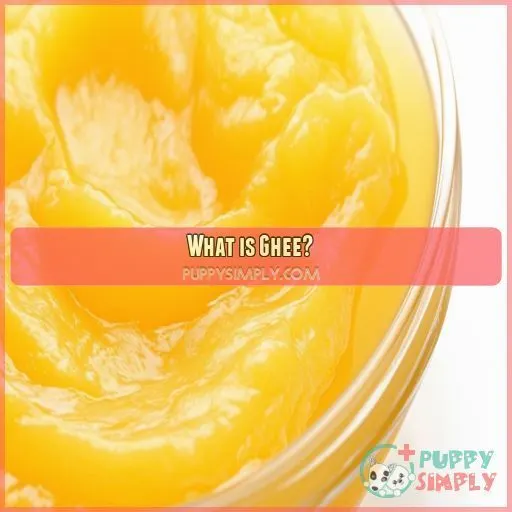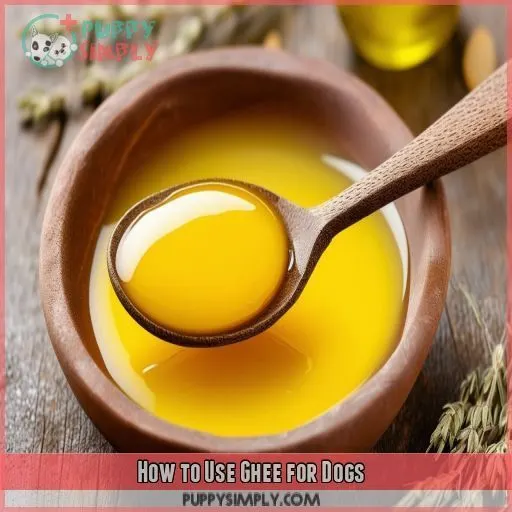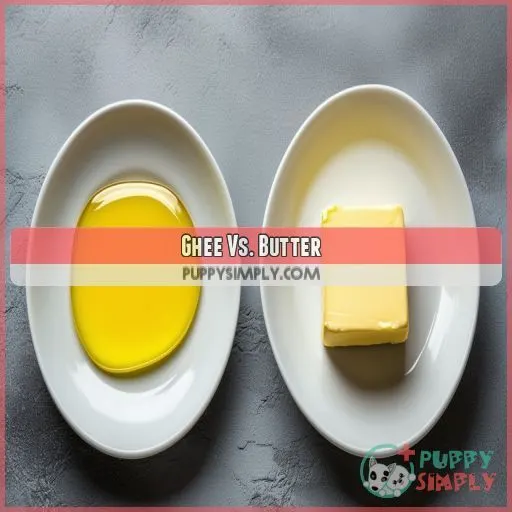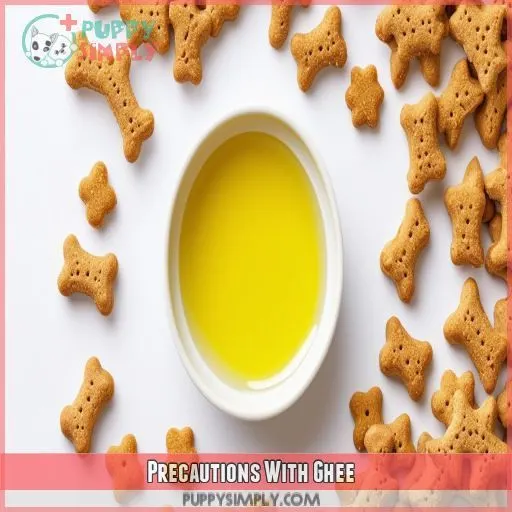This site is supported by our readers. We may earn a commission, at no cost to you, if you purchase through links.
 Yes, dogs can eat ghee! This clarified butter made from cow’s milk is not only safe but offers surprising benefits for your furry friend.
Yes, dogs can eat ghee! This clarified butter made from cow’s milk is not only safe but offers surprising benefits for your furry friend.
Ghee is loaded with healthy fats, antioxidants, and CLA that reduce inflammation, boost immunity, and improve brain health. It’s also rich in calcium and vitamin D for strong bones.
You can mix a small amount (based on your pup’s size) into their food or give it as a treat. Ghee can even be applied topically to soothe dry skin.
With its concentrated nutrients and easy digestibility, adding a bit of ghee to your dog’s diet could be a game-changer.
Want to learn more about the benefits of this nutritious butter substitute?
Table Of Contents
Key Takeaways
- Ghee is a clarified butter that’s like a nutritional powerhouse for your furry friend – it’s loaded with healthy fats, antioxidants, and CLA that can reduce inflammation, boost immunity, and even improve brain function. It’s like giving your pup a superfood supplement!
- When it comes to using ghee for your dog, moderation is key. Start with just a small amount (think 1/4 to 1 teaspoon per day, depending on their size) and work your way up. You don’t want to overdo it and give your pup a case of the butter-burps, if you catch my drift!
- Not only can you mix ghee into your dog’s food or give it as a treat, but you can also use it topically to soothe dry or irritated skin. It’s like a natural, buttery balm for your pup’s paw-pads and hot spots.
- When choosing ghee for your dog, go for the grass-fed variety. It’ll be richer in those omega-3s and vitamins that’ll have your pup feeling like a million bucks (or should I say, a million bones?). Plus, you’ll be supporting sustainable farming practices – a win-win for you and your furry pal!
Can Dogs Eat Ghee?
Yes, dogs can eat ghee in moderation as a nutritious supplement. Ghee, a type of clarified butter, is a good source of Healthy fats and contains vitamins that can benefit a dog’s bones, immune system, and brain health.
What is Ghee?
You’re likely familiar with butter, but have you heard of ghee? This clarified butter is made by gently simmering cow’s milk butter to remove milk solids.
The result is a concentrated, shelf-stable fat rich in vitamins, antioxidants, and healthy fats like vitamin K2 and conjugated linoleic acid (CLA). Ghee is lactose-free, making it ideal for dogs with dairy sensitivities.
Plus, ghee from grass-fed cows provides an extra nutritional boost for a healthy coat.
Benefits of Ghee for Dogs
Ghee provides a concentrated source of healthy fats, antioxidants, and conjugated linoleic acid (CLA) that can greatly benefit your dog’s wellbeing. Its anti-inflammatory properties aid in reducing joint pain, boosting immunity, and promoting brain health – making ghee an ideal addition to your pup’s diet.
Builds Strong Bones
Ghee builds strong bones through its calcium and vitamin D content. You’ll notice:
- Improved bone density
- Healthier joints
- Better mobility
- Enhanced growth for puppies
- Reduced risk of arthritis
Incorporating ghee boosts your dog’s skeletal strength.
Reduces Inflammation
You’ll appreciate ghee’s anti-inflammatory properties for relieving joint pain and promoting skin health. Its CLA, butyric acid content supports a healthy immune system, brain development, and improved digestion – ideal for topical use too!
Boosts Immunity
You’ll boost your dog’s immune system by feeding ghee regularly. Its anti-inflammatory properties reduce inflammation, protecting against infections and diseases. Ghee’s fatty acids also support cognitive function and soothe skin irritations and dry skin or elbow calluses.
Improves Brain Health
Ghee’s high omega-3 content supports brain function, cognitive enhancement, and memory improvement. Its antioxidants offer neuroprotective benefits, making it a valuable dietary addition for canine mental acuity.
How to Use Ghee for Dogs
Ghee can be fed to dogs in small quantities (1/4 to 1 teaspoon per day, depending on their size), either mixed into their food or given as a treat. Additionally, ghee can be applied topically to soothe dry or irritated skin areas; simply warm it slightly before gently massaging it into the affected regions.
Feeding Guidelines
You can safely feed ghee to your dog in small quantities as part of a balanced diet.
Start with 1/4-1 tsp per day, depending on your dog’s size.
Ghee benefits include:
- Aiding digestion
- Reducing inflammation that causes joint pain or skin irritation
- Promoting healthy brain function
- Supporting immunity
However, cycle ghee rather than feeding it daily to avoid overconsumption of fats.
Topical Application
You can also use ghee topically to soothe skin irritations or dry areas.
Simply warm some ghee slightly and apply it directly to the affected area. The moisturizing fats help hydrate and heal cracked or inflamed skin.
Using homemade ghee guarantees you get all the topical use benefits without additives.
For hot spots, rashes, or dryness, ghee’s anti-inflammatory properties make it a natural, soothing remedy.
Ghee Dosage for Dogs
When introducing ghee to your dog’s diet, it’s essential to start with small portions and adjust based on their size. For small dogs (5-25 lbs), begin with 1/4 teaspoon daily; for medium dogs (25-55 lbs), try 1/2 teaspoon; and for large dogs (over 55 lbs), 1 teaspoon should suffice.
Small Dogs
For small dogs (5-25lbs), start with 1/4 tsp of ghee daily as a supplement. Ghee is ideal for puppies’ brain development, seniors’ joint lubrication, overweight dogs’ weight management, allergies’ anti-inflammatory properties, and skin conditions’ moisturizing benefits. Monitor for digestive tolerance when introducing ghee.
Medium Dogs
For medium dogs (25-55lbs), feed 1/2 tsp of ghee daily. You can:
- Mix it into their food
- Spread it on treats
- Give it as a topper
Ghee provides anti-inflammatory benefits, boosting joint health for active medium breeds. Cycle ghee into their diet to reap its nutritious rewards.
Large Dogs
For large dogs (55+ lbs), you can give up to 1 teaspoon of Grass-fed ghee per day. Homemade ghee guarantees quality control and potency. Incorporate ghee into your pup’s diet by adding it to meals, homemade treats, or using it for cooking. Proper storage prevents rancidity, preserving ghee’s rich nutrients and benefits.
Ghee Vs. Butter
Ghee stands apart from regular butter due to its removal of casein, a milk protein that can cause inflammation in dogs. As a concentrated fat without the proteins that may affect canine digestion, ghee is a nutritious food rich in conjugated linoleic acid (CLA), aiding in the absorption of essential vitamins and minerals.
Casein Removal
One key difference between ghee and butter is the removal of casein. This dairy protein can trigger:
- Casein intolerance
- Inflammatory response
- Allergies
- Digestive issues & skin irritation
In ghee, casein is removed, making it a safer option for dogs with sensitivities.
Concentrated Fat
With the milk solids removed, ghee is a concentrated source of healthy fats. It’s a better option than butter for dogs, as its saturated fat content is more easily digested and less inflammatory.
| Ghee | Butter |
|---|---|
| High in healthy fats | Contains milk proteins |
| Easily digestible | Can cause inflammation |
| Natural cooking alternative | Less concentrated nutrients |
Rich in CLA
You’re in luck—ghee contains high levels of conjugated linoleic acid (CLA), an essential fatty acid with remarkable health benefits. CLA boosts immunity, decreases inflammation, and promotes lean muscle mass. Your dog’s body can’t produce CLA, so incorporating ghee provides a nutritious CLA source that’s easily absorbed and metabolized.
Precautions With Ghee
While ghee is generally safe for dogs, you should be cautious with portion sizes, especially for overweight or senior dogs.
Too much ghee can cause digestive upset like diarrhea or vomiting.
Introduce it slowly to their diet and discontinue use if any adverse reactions occur.
Ghee shouldn’t be fed to puppies under 6 months old.
As with any new food, monitor your dog closely when first incorporating ghee.
Choosing Quality Ghee
When choosing ghee for your dog, look for products made from grass-fed butter, as this guarantees higher levels of beneficial nutrients like omega-3s and vitamins. The cooking method and shelf life are also important considerations – traditional methods like using a clay pot and monitoring the temperature carefully during the clarification process can impact quality and freshness.
Grass-Fed Butter
Opt for ghee made from grass-fed butter for superior nutrition:
- Richer in anti-inflammatory omega-3s and vitamins
- Deeper, more intense flavor profile
- Better for the environment and animal welfare
- Supports sustainable farming practices
Quality ghee starts with the finest ingredients. Choosing grass-fed elevates health benefits for your pup.
Cooking Method
Additionally, the cooking method is essential for quality ghee. It should be gently simmered at low temperatures, allowing the milk solids to caramelize without burning the fat. This slow heating process enhances ghee’s rich, nutty flavor and preserves its beneficial nutrients.
Shelf Life
You’ll also want to contemplate ghee’s shelf life when selecting quality products. Properly made ghee stored at room temperature can last 6-12 months. Refrigerating or freezing it extends shelf life further, helping prevent rancidity. Checking best-by dates and storage methods will guarantee you get fresh, quality ghee.
Incorporating Ghee Into Diet
Now that you understand the importance of choosing quality ghee, you may wonder how to incorporate it into your dog’s diet. Here are a few simple ways to do so:
- Drizzle over their regular food for an extra nutrient boost
- Use it as a topper for homemade dog treats
- Mix with their regular kibble or wet food
- Add to bone broths or homemade dog food recipes
- Give plain as an occasional treat (in moderation)
Start slowly and monitor your pup’s reaction. With its beneficial fatty acid profile and anti-inflammatory properties, ghee can be a healthy addition.
Frequently Asked Questions (FAQs)
Is ghee safe for dogs with pancreatitis?
While ghee boasts benefits, it’s best avoided for pups with pancreatitis. The high-fat content could exacerbate inflammation, triggering discomfort and digestive woes. Stick to low-fat, easily-digestible fare to keep your furry friend feeling their best.
Can puppies consume ghee safely?
You can safely give puppies a small amount of ghee, like 1⁄4 teaspoon daily. Ghee provides healthy fats and nutrients that support growth and development. However, moderation is key to prevent digestive upset or obesity in growing pups.
Are there side effects of overfeeding ghee?
Yes, overfeeding ghee can lead to pancreatitis, obesity, and digestive issues in dogs. Moderation is key – stick to the recommended serving sizes based on your pup’s weight to reap the benefits safely.
Is ghee better than coconut oil for dogs?
You bet your bottom dollar ghee reigns supreme! This golden liquid fat trumps coconut oil for pups, boasting more tummy-friendly vitamins and anti-inflammatory riches to keep Fido thriving.
How long does ghee stay fresh after opening?
Once opened, ghee can stay fresh for 6-12 months when stored in an airtight container at room temperature. Its high smoke point and lack of moisture make ghee incredibly shelf-stable compared to regular butter.
Conclusion
Unlocking the power of ghee’s concentrated nutrients can be a game-changer for your pup’s well-being. This ancient superfood offers a treasure trove of benefits, from building strong bones to reducing inflammation and boosting immunity.
Go ahead, explore adding a dollop of ghee to your dog’s diet and witness how this nutritious butter substitute can elevate their health to new heights. Remember, moderation is key when it comes to whether dogs can eat ghee.














